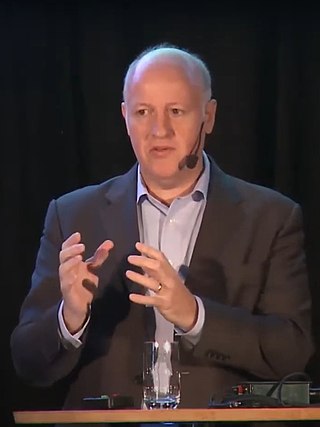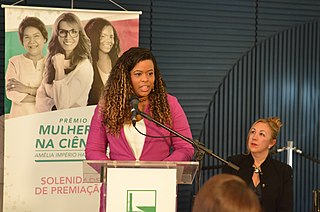Related Research Articles

Genomics is an interdisciplinary field of molecular biology focusing on the structure, function, evolution, mapping, and editing of genomes. A genome is an organism's complete set of DNA, including all of its genes as well as its hierarchical, three-dimensional structural configuration. In contrast to genetics, which refers to the study of individual genes and their roles in inheritance, genomics aims at the collective characterization and quantification of all of an organism's genes, their interrelations and influence on the organism. Genes may direct the production of proteins with the assistance of enzymes and messenger molecules. In turn, proteins make up body structures such as organs and tissues as well as control chemical reactions and carry signals between cells. Genomics also involves the sequencing and analysis of genomes through uses of high throughput DNA sequencing and bioinformatics to assemble and analyze the function and structure of entire genomes. Advances in genomics have triggered a revolution in discovery-based research and systems biology to facilitate understanding of even the most complex biological systems such as the brain.

Fiona Brinkman is a Professor in Bioinformatics and Genomics in the Department of Molecular Biology and Biochemistry at Simon Fraser University in British Columbia, Canada, and is a leader in the area of microbial bioinformatics. She is interested in developing "more sustainable, holistic approaches for infectious disease control and conservation of microbiomes".
Pathogenomics is a field which uses high-throughput screening technology and bioinformatics to study encoded microbe resistance, as well as virulence factors (VFs), which enable a microorganism to infect a host and possibly cause disease. This includes studying genomes of pathogens which cannot be cultured outside of a host. In the past, researchers and medical professionals found it difficult to study and understand pathogenic traits of infectious organisms. With newer technology, pathogen genomes can be identified and sequenced in a much shorter time and at a lower cost, thus improving the ability to diagnose, treat, and even predict and prevent pathogenic infections and disease. It has also allowed researchers to better understand genome evolution events - gene loss, gain, duplication, rearrangement - and how those events impact pathogen resistance and ability to cause disease. This influx of information has created a need for bioinformatics tools and databases to analyze and make the vast amounts of data accessible to researchers, and it has raised ethical questions about the wisdom of reconstructing previously extinct and deadly pathogens in order to better understand virulence.

CSIR Institute of Genomics and Integrative Biology (CSIR-IGIB) is a scientific research institute devoted primarily to biological research. It is a part of Council of Scientific and Industrial Research (CSIR), India.

Niyaz Ahmed is an Indian molecular epidemiologist, professor of microbial sciences, genomicist, and a veterinarian by training, based in Hyderabad.

Redeemer's University is a private university in Ede, Osun State, Nigeria. Established in 2005, it is owned by the Redeemed Christian Church of God and situated off the Ibadan-Osogbo Road.
The John P. Hussman Institute for Human Genomics (HIHG) is a genome center at the University of Miami's Miller School of Medicine in Miami, Florida.
The Australian Institute of Tropical Health and Medicine (AITHM) is an Australian tropical health and medical research institute based at James Cook University (JCU) in Townsville and Cairns, Queensland. Formerly known as the Australian Institute of Tropical Medicine, AITHM was established at JCU in 2008.

Julian Parkhill is Professor of Bacterial Evolution in the Department of Veterinary Medicine at the University of Cambridge. He previously served as head of pathogen genomics at the Wellcome Sanger Institute.
Mark J. Pallen is a research leader at the Quadram Institute and Professor of Microbial Genomics at the University of East Anglia. In recent years, he has been at the forefront of efforts to apply next-generation sequencing to problems in microbiology and ancient DNA research.
Sharon Jayne Peacock is a British microbiologist who is Professor of Public Health and Microbiology in the Department of Medicine at the University of Cambridge. Peacock also sits on Cambridge University Council.

The Philippine Genome Center (PGC) is a multi-disciplinary research facility in Quezon City, Metro Manila, Philippines which specializes in genomics.

Willem van Schaik is a Dutch microbiologist. He is professor of Microbiology and Infection at the University of Birmingham.
Clinical metagenomic next-generation sequencing (mNGS) is the comprehensive analysis of microbial and host genetic material in clinical samples from patients by next-generation sequencing. It uses the techniques of metagenomics to identify and characterize the genome of bacteria, fungi, parasites, and viruses without the need for a prior knowledge of a specific pathogen directly from clinical specimens. The capacity to detect all the potential pathogens in a sample makes metagenomic next generation sequencing a potent tool in the diagnosis of infectious disease especially when other more directed assays, such as PCR, fail. Its limitations include clinical utility, laboratory validity, sense and sensitivity, cost and regulatory considerations.

Peter Daszak is a British zoologist, consultant and public expert on disease ecology, in particular on zoonosis. He is the president of EcoHealth Alliance, a nonprofit non-governmental organization that supports various programs on global health and pandemic prevention. He is also a member of the Center for Infection and Immunity at the Columbia University Mailman School of Public Health. He lives in Suffern, New York.

Jaqueline Góes de Jesus is a Brazilian scientist and researcher. She was part of the team which sequenced the Zika virus. During the COVID-19 pandemic, she was a member of the team responsible for sequencing the first genome of the SARS-CoV-2 virus in Brazil.

The COVID-19 Genomics UK (COG-UK) consortium was a group of academic institutions and public health agencies in the United Kingdom created in April 2020 to collect, sequence and analyse genomes of SARS-CoV-2 at scale, as part of COVID-19 pandemic response.
Trevor Bedford is an American computational virologist at Fred Hutchinson Cancer Research Center.
Tulio de Oliveira is a Brazilian, Portuguese, and South African permanent resident professor of bioinformatics at the University of KwaZulu-Natal and Stellenbosch University, South Africa, and associate professor of global health at the University of Washington. He has studied outbreaks of chikungunya, dengue, hepatitis B and C, HIV, SARS-CoV-2, yellow fever and Zika. During the COVID-19 pandemic he led the team that confirmed the discovery of the Beta variant of the COVID-19 virus in 2020 and the Omicron variant in 2021.
Alan Christoffels is a bioinformatics scientist, academic, and an author. He is Professor of Bioinformatics, and the director of the South African National Bioinformatics Institute at the University of the Western Cape. He has been serving as a senior advisor to the Africa Centres for Disease Control and Prevention Pathogen genomics & Partnerships and DSI/NRF Research Chair in Bioinformatics and Public Health Genomics.
References
- ↑ Frank, Allegra (26 February 2018). "PAX organizer acquires USgamer, Eurogamer and more". Polygon . Archived from the original on 17 June 2019. Retrieved 30 June 2019.
- ↑ "History – About". Gamer Network. Archived from the original on 2 May 2019. Retrieved 5 July 2019.
- ↑ "Loman, Nicholas James (2012). Comparative bacterial genomics. University of Birmingham. Ph.D."
- ↑ "Real-time, portable genome sequencing for Ebola surveillance".
- ↑ "nCoV-2019 novel coronavirus bioinformatics protocol".
- ↑ Gallagher, James (10 June 2020). "Coronavirus came to UK 'at least 1,300 times'" – via www.bbc.co.uk.
- ↑ "Professor Nick Loman - School of Biosciences - University of Birmingham".
- ↑ "Nicholas Loman". The Alan Turing Institute.